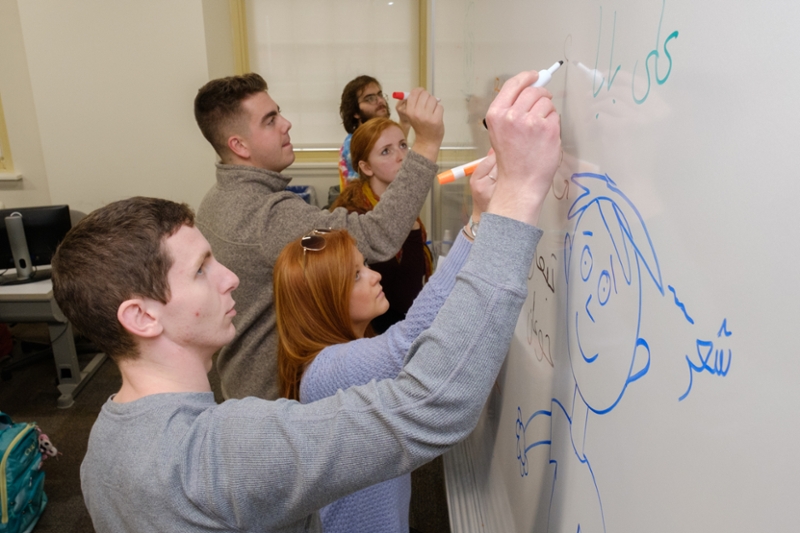

Award-winning collaboration “HumanitiesWorks” uses data to disprove public perception
By Shavon Anderson, university news and communications
Major at your own risk. That’s often the public perception of students who choose to study philosophy over finance or English over engineering.

Students work on an exercise at Miami's Interactive Language Resource Center.
Here’s the reality: “There’s virtually no long-term difference in career satisfaction, income, employability and other metrics between people who major in business and people who study history or anthropology,” said Tim Melley.
Melley, professor of English and director of the Humanities Center, is part of a team at Miami expanding possibilities for humanities majors where other schools nationwide are shuttering programs.
In 2015, he set out with staff from the Center for Career Exploration & Success (CCES) to build an evidence-based career advising system across the humanities departments. The team – which now includes Renée Baernstein, senior associate dean for the College of Arts and Science, Jennifer Franchak, assistant vice president for CCES, and Shelby Summers Ballard, associate director of academic initiatives and special projects with CCES – developed a work group. That group became HumanitiesWorks. The collaboration allows faculty to explore the value of their respective degrees while focusing on relevant career opportunities for students.
For nearly a year and a half, faculty met with Melley and career center staff to learn about resources, universal skills important to employers and student expectations related to job preparation. They also visited regional companies and met with alumni to discuss recruitment.
Within two years, humanities student engagement at career fairs increased by 329%, and career advising appointments with humanities students increased by 266%.
Relaunch and expansion
In 2018, the project continued as HumanitiesWorks 2.0, bringing in new faculty across six areas. The group helped departments develop advising programs, create updated print and digital media brochures and helped to bring in alumni to discuss the evolving job market.
“We’ve worked together to explore, promote, showcase and translate the value of these degrees to students and parents,” said Ballard. “While our work isn’t done, it’s exciting to collaborate with a passionate group of people who are committed to postgraduate success.”
The initiative fundamentally changed the relationship between the humanities departments and CCES by establishing more trust and creating a pipeline for student resources. The center expanded its offerings by bringing in major-specific recruiters and hosting more humanities-targeted events.
This year, HumanitiesWorks won the 2019 Career Innovation Showcase through the Career Leadership Collective. Winners are chosen based on efforts that develop unique connections for campuswide career services, develop outreach and produce successful change.
In March, Miami alumni visited Oxford to discuss career opportunities as the team prepares to launch HumanitiesWorks 3.0, which includes incorporating problem-based learning in classes and providing experiential learning opportunities and externships.
A message for parents
Even in the few years since HumanitiesWorks started, the field continues to rapidly change. Baernstein sees evidence in the stabilization of humanities majors. In some areas, like philosophy and religion, there’s a marked increase in interest.
To her, the initiative is about more than immediate job placement.
“It’s about setting you up for a life well-lived and well-employed,” she said. "As a Miami grad, you will be able to get a job. Plus, by majoring in what you love, you will add meaning and value to your whole life."
With more students engaging in career services earlier, the next measurement goal is ensuring that students are not only getting jobs in their field but securing their top choices as soon as possible.
However, the messaging about the value of the humanities and liberal arts reaches past prospective students and stakeholders.
“I hope more parents will let their kids study what they love and understand that it’s not only a financial decision,” Melley said. “Someone who works hard and works with passion is going to be happier and is also going to be better at competing for jobs in the current economy.”
To learn out more about Miami’s humanities degree programs, visit the university's full majors and minors page.
